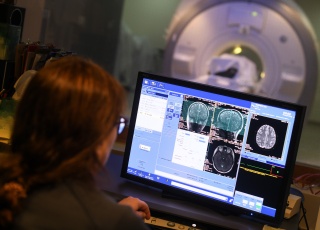Neurointerventional Radiology
Neurointerventional Radiology at UVM Health
Neurointerventional radiologists at University of Vermont Health offer patients leading-edge, minimally invasive approaches to diagnose and treat blood vessel disorders of the brain and spine. Our skilled experts perform catheter-based procedures to safely enter the delicate vessels of the head and neck to treat bleeding, blockages and other serious conditions.
Our integrated health system provides you with comprehensive neurointerventional radiology services throughout Vermont and northern New York.

Why Choose UVM Health?
As key members of the UVM Health's Primary Stroke Center program — a regional referral center — our fellowship-trained neurointerventional radiologists have extensive experience using advanced technology for the lifesaving treatment of patients with complex strokes.
- State-of-the-art treatment: UVM Health neurointerventional radiologists perform minimally invasive procedures on the brain and spine using needles or catheters, resulting in less pain and a faster recovery than traditional open surgery. To safely enter and treat the fragile blood vessels and arteries in the brain, we use a range of innovative medical devices, such as platinum coils and blood flow-diverting stents to prevent the rupture of brain aneurysms.
- Multidisciplinary team: From initial consultations to follow-up care after your procedure, our neurointerventional radiologists directly oversee your care and collaborate with specialists across the UVM Health, including neurosurgeons, stroke neurologists, otolaryngologists (ENT experts) and orthopedic surgeons. Physician assistants and nurses specially trained in neurointerventional radiology and stroke care are also part of your expert and compassionate care team.
- Research-driven care: Our physicians are active researchers, pioneering innovations in interventional neuroradiology to enhance the care we provide to you. Our involvement in research gives our patients access to promising emerging therapies that aren’t widely available.
Conditions We Treat with Neurointerventional Radiology Procedures
Neurointerventional radiology procedures are among the least invasive surgical methods available for treating the brain and spine, greatly reducing potential risks associated with intensive open surgery.
At UVM Health, our interventionalists are specifically trained to treat either vascular or neurovascular conditions, so you can be sure you’re receiving care from a physician with deep expertise and experience treating your particular medical issue.
We offer interventional neuroradiology services for a variety of conditions, including:
- Arteriovenous malformations
- Brain aneurysms
- Complex strokes
- Intracranial hypertension
- Subdural hemorrhages
- Vertebral compression fractures
- Carotid artery stenosis
What to Expect from a Procedure
The use of sophisticated image guidance and special instruments allows our neurointerventional radiologists to provide effective, minimally invasive surgical solutions to prevent and manage both common and potentially life-threatening conditions.
Many procedures are performed using moderate sedation for faster recovery than general anesthesia. For additional monitoring and pain management, some interventions may require you to spend a night or two in the hospital — still far less time than most conventional surgeries.
Depending on your condition, your interventional neuroradiologist may only need to make one very small incision, through which they will insert needles, wires, catheters and other thin instruments. These special tools make it possible for your physician to perform a variety of surgical treatments to remove blockages or clog (embolize) blood vessels to stop bleeding or blood flow to a tumor or diseased tissue.
Your provider will advise you on how to best prepare for your specific procedure.
Awards & Certifications
American Board of Medical Specialties
All UVM Health interventional neuroradiologists have earned board certification from the American Board of Medical Specialties. This recognition ensures that your neurointerventional radiology procedure is performed by a physician who meets the rigorous standards set by the specialty and their peers in the field.
American Board of Radiology
Specializing in the use of X-ray, CT scans and other precision image-guiding technologies for interventional procedures, our specialists are also certified by the American Board of Radiology (ABR).
Locations near you
Share your location to see nearby providers and availability
111 Colchester Avenue
Main Campus, McClure, Level 1
Burlington, VT 05401-1473

